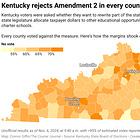Texas takes a big step toward destroying the separation of church and state
Inside the latest blow to secular society
Welcome to a Saturday edition of Progress Report.
Before we start, I want to explain why this newsletter has not been quite as prolific as usual over the past week or so. The truth is that I’m dealing with some health issues connected to the heart surgery that I underwent in February, and it’s slowing me down more than anticipated. I’m having a procedure that will hopefully address a bulk of the problems the week after Thanksgiving. After that, I should be back to full service.
OK, with that out of the way, a note about tonight’s newsletter: It’s funny that I’ve been writing about education so much, because I mostly disliked school growing up. But few things are more important than education policy, in part because schools have long been political battlefields in proxy wars. Today, Christian nationalists are waging a war on public schools as a Trojan horse to rewrite our laws and Constitution, and as we’ll see tonight, it’s already having a dangerous impact.
Note: This is going to be a long four years — and perhaps much longer, if Donald Trump and his newly empowered Republican Party accomplish their goals.
As right-wing media metastasizes, billionaires use outlets as tools of appeasement, mainstream media fails, and corporations sell off news divisions, we need independent media to step into the breach. Please make Progress Report and make this work possible — just $5 a month makes all the difference.
Thank you to our latest crowd-funding donors:
Texas takes a big step toward destroying the separation of church and state
The Texas Board of Education voted to approve a controversial new curriculum for elementary school students on Friday, setting up classrooms around the state to teach Christianity-infused lessons as early as next year.
The curriculum, known as Bluebonnet Learning, was developed by the Texas Education Agency with the help of several subcontractors, including a company run by former Arkansas Gov. Mike Huckabee, who Donald Trump just chose to serve as ambassador to Israel. Lessons for both English and Language Arts are being made available to all school districts, and while it’s optional, the state is offering $60 per student to districts that implement it. As other money dries up post-pandemic, it’s very likely that many districts will feel obligated to take the cash.
When it was initially released last spring, historians and critics pointed to an enormous number of inaccuracies in how the material explained Bible stories and depicted — or didn’t depict — religious persecution. Edits were made, but there were still enough offensive passages and broader inequities that hundreds of people testified against it at the Board of Education meetings and three Republicans joined Democrats to vote against its passage. Had Gov. Greg Abbott not added a temporary Republican appointee who voted to approve the material, it would not have passed.
Here’s a sample of what was in this curriculum and what remains:
The third grade unit on Jesus’s life and early Christianity no longer says that Christians hid in the catacombs to worship, a myth that scholars have debunked. The unit also excludes the miracle of the disciples’ overflowing fishing nets, reducing the lesson on Jesus from eight pages to seven.
But it still cites Josephus, a first century historian, who reported that Jesus’ disciples said that he “appeared to them three days after his crucifixion and that he was alive.” Biblical scholars reject his account, which was probably added by priests during the Middle Ages in an effort to prove that Jesus was the son of God.
The state eliminated what Texas Jews said was an offensive activity in which students would play dice to mimic how Haman, a Persian functionary in the biblical story of Queen Esther, cast lots to decide when to kill the Jews.
A third grade lesson still says Spanish conquistadors’ merely “shared” their Christian faith with indigenous tribes and doesn’t delve into slavery, forced labor and other harsh methods used to convert them.
The updates don’t “correct the overall problem of soft pedaling Christian involvement with violence and oppression in the past,” he said.
To get a better understanding of what’s in the material and what the political implications of it will be, I spoke with Democratic state Rep. James Talarico, a former teacher who is now moonlighting as a seminary student. Talarico has been both closely involved in the work to fix the material and outspoken in his objection to it.
“I'm in this unique position where I know the difference between teaching and preaching, and it's a really important difference,” he told me. “There's a lot of similarities, and under federal law schools can teach the Bible as an academic text, but not in a devotional way. The way I've been summing it up is that public schools are not Sunday schools.”
Talarico described the nitty gritty of the curriculum, explained the political context, offered insight into what might happen next in Texas, and offered a word of warning that should be heeded by all.
Progress Report: You’ve been involved in the nitty gritty of the curriculum. In what ways did it cross the line and where do the biggest problems remain?
Rep. Talarico: I worked with the Commissioner of Education here to get rid of the most egregious parts of the curriculum, but the one that just passed still has a lot of problems with it. It still definitely elevates Christianity over the other great faith traditions of the world and it's slanted and biased in one direction.
The Texas Education Agency bought a national reading curriculum that was produced by a well-respected publisher called Amplify. When they bought that curriculum, they made revisions to it. Typically teaching about religion in a public school context, you would say something like, “According to Christians, Jesus rose from the dead after three days,” or “According to the Christian Bible, Jesus walked on water.” That’s what Amplify did, and I have no problem with that. I think students should learn about the great world religions. They need to know about it for history and literature and art.
The new Texans revisions took out those qualifiers. So instead of “According to Christians,” it was just “Jesus rose from the dead after three days, period.” Or instead of “According to Christian scriptures, Jesus walked on water,” it was “Jesus walked on water, period.” So even though just a few words were taken out, that's a giant difference when you're talking about small children and young students. One is positioning something as objective historical fact; the other is portraying it as an article of belief, a part of a tradition. We got a lot of those qualifiers added back in.
In the other part that I helped revise, there was a section for kindergarten students about the Golden Rule, and it basically attributed it to Jesus. I’m a big fan of Jesus, but I know that Jesus didn't come up with the Golden Rule. Buddha talked about the same idea, of loving others as yourself, thousands of years before Jesus ever walked the earth. Moses did too, and Muhammad has has very similar teachings.
We revised the kindergarten lesson, and actually in a pretty beautiful way. It is now a chart of where the Golden Rule appears in all of these different faith traditions, which I think is a really cool lesson to teach kids.
But the curriculum is still heavily slanted toward Christianity in terms of the time allocated. There are mentions of other religions, but much, much more focus is put on Christianity. The argument could be made that Christianity is the dominant religion in the United States, and that’s true, but I would argue that that means we should be teaching more about other religions. If school is about being exposed to the things you don't know, then you should be learning about the other traditions.
[The curriculum] is still encouraging teachers to play Christian songs, like “Away in a Manger” and things like that, when there's no equivalent for other traditions. So it still feels biased, still feels slanted, like it's pushing an agenda. Or as Greg Abbott is fond of saying, it feels like indoctrination, not education.
And it doesn’t seem like there’s a lack of other ways for kids to learn about Christianity in our society. So who what’s the purpose? To convert people? To establish a sort of state religion?
Rep. Talarico: These kind of Christian nationalist bills are not just unconstitutional, they're not just un-American, they're also deeply un-Christian. Jesus taught us to love our neighbors as ourselves. And as the parable of the Good Samaritan shows, I can't imagine something Jesus would hate more than people forcing our religion down the throat of the Jewish student, the Muslim student, the Hindu student, the Buddhist student, the atheist student, all sitting in a classroom in a Texas public school.
And it’s one of several school policies that have been kicking around the Texas legislature to do just that. As a legislator, how have you viewed what’s been happening these past few years?
Rep. Talarico: It’s important for us to not consider these different policies or curricula in isolation, because it is all part of the same movement, of Christian nationalism. We saw a bill last legislative session to force every Texas teacher to post the 10 Commandments. We saw the bill to replace school counselors with untrained chaplains. We saw a bill to defund public schools and subsidize private Christian schools. Now there’s this curriculum that is attempting to teach Christian Bible stories as historical fact.
This is all part of the same coordinated campaign to destroy the separation of church and state in our United States Constitution, destroy religious freedom, and elevate Christianity above the other great faith traditions, and essentially to dominate our neighbors.
There have been people already suggesting lawsuits over this, but having seen the way circuit and appeals courts work down there, will that make a difference?
Rep. Talarico: The courts are increasingly bought and paid for. The courts are increasingly partisan and controlled by the Republican Party, including the US Supreme Court. I saw a tweet the other day about the Democratic Party being the coach from Air Bud, holding the rule book and saying, “Dogs can't play basketball,” right? We all keep yelling about this not being allowed, and it keeps happening, right? Your rules don't mean anything if [conservatives] control the judiciary.
It’s a nice delusion, like courts will regulate themselves.
Rep. Talarico: Is this 1995 or 2005? A lot of my older colleagues have the same attitude, like, oh well, the courts will take care of us. And I'm like, I don't know what decade you're living in, but the courts aren't coming to our rescue.
So what comes next? And do you think it’ll have its intended impact on students? Does this kind of indoctrination work?
Rep. Talarico: I think we're going to see further erosion to the Constitution. I think we're going to see public schools looking more like private religious schools. I say this as a person of faith, as a seminarian, as someone who wants to become a Christian minister: I do think the unintended consequence of these Christian nationalist policies is that they will create an entirely new generation of atheists. Because children are going to see this, they’re going to see faith through coercion and domination, and they're going to say, “I don't want anything to do with that.” And that just breaks my heart.
Greg Abbott failed to get vouchers passed again, so this feels like an alternative: If we can’t send public school money to religious schools, we’ll just add religion to public schools.
Rep. Talarico: I think it's coming at it from both angles. We’ve got to take these people seriously. Their goal is theocracy. Their goal is the Christian Taliban. You see it with banning books, banning abortion. You see with undermining elections. You see it with with, you know, religious indoctrination in public schools and trying to dismantle public schools. They're coming at this from all angles.
I just feel like people who don't want a theocracy are in denial. These folks, their ultimate vision is to dismantle public education as we know it, and people think that can never happen. That's exactly we thought about reproductive rights, then one day it was just gone, something that we all took for granted. I don't know what's going to take for us to understand that the other side is playing for keeps.
Where do you think the line is for people? Because polls show that a vast majority of people love secular public education — vouchers just got creamed in Kentucky and Nebraska — yet they vote for the lawmakers who push these policies.
Rep. Talarico: I think there is a durable majority that rejects these policies, yet because of the election results, people are going to see a lot more of [Christianity in school]. I also think that blue states are going to find out that this is not a problem only people in red states are suffering under. Because of Trump and and Project 2025, I think some of this stuff may be coming to a school near you. Not that I would wish this on anyone, but it might be good for us all to be in this together.
The voucher fight [in Texas] was interesting because it showed that there is still a bipartisan majority that rejects these policies. It was rural Republicans joining with urban and suburban Democrats. The reason that I was able to get these revisions to their curriculum native was a ton of Texans saw some of the videos I was posting about it, read about it in the news, and they flooded the State Board of Education with phone calls. And it wasn't just Democrats and progressives, it was also people of faith who don't want the government usurping the role of the church.
So what’s next in Texas as session gets started?
Rep. Talarico: I think vouchers will be the issue for the session, because we just defeated it last time. Greg Abbott try again. So we'll see where that goes. They've already refiled the 10 Commandments bill that we defeated last time. So I think we'll see where that goes. We will probably see even further attacks on on the First Amendment, on the separation of church and state, and we're gonna have to both fight those on the floor of the House that but also try to channel people's outrage into some kind of productive electoral action.
🔍 Headline
This is the story
What it means:
Why it matters:
What’s next:
Wait, Before You Leave!
Progress Report has raised over $7 million dollars for progressive candidates and causes, breaks national stories about corrupt politicians, and delivers incisive analysis, and goes deep into the grassroots.
None of the money we’ve raised for candidates and causes goes to producing this newsletter or all of the related projects we put out. In fact, it costs me money to do this. So, I need your help.
For just $5 a month, you can buy a premium subscription that includes:
Premium member-only newsletters with original reporting
Financing new projects and paying new reporters
Access to upcoming chats and live notes
You can also make a one-time donation to Progress Report’s GoFundMe campaign — doing so will earn you a shout-out in the next weekend edition of the newsletter!











Frightening, truly frightening! Thanks for interviewing Rep Talarico, super illuminating. Good luck with the cardiac issues, sending good healing, strengthening thoughts to you
beautifully contextualized… my exact experience with religion and christianity made me hate religious domination before i could see the potential of healthy interfaith communication and capacity building…